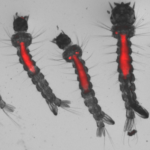Link to Pubmed [PMID] – 25562286
Nat Commun 2015 Jan;6:5921
Malaria reduction is most efficiently achieved by vector control whereby human populations at high risk of contracting and transmitting the disease are protected from mosquito bites. Here, we identify the presence of antibiotics in the blood of malaria-infected people as a new risk of increasing disease transmission. We show that antibiotics in ingested blood enhance the susceptibility of Anopheles gambiae mosquitoes to malaria infection by disturbing their gut microbiota. This effect is confirmed in a semi-natural setting by feeding mosquitoes with blood of children naturally infected with Plasmodium falciparum. Antibiotic exposure additionally increases mosquito survival and fecundity, which are known to augment vectorial capacity. These findings suggest that malaria transmission may be exacerbated in areas of high antibiotic usage, and that regions targeted by mass drug administration programs against communicable diseases may necessitate increased vector control.

